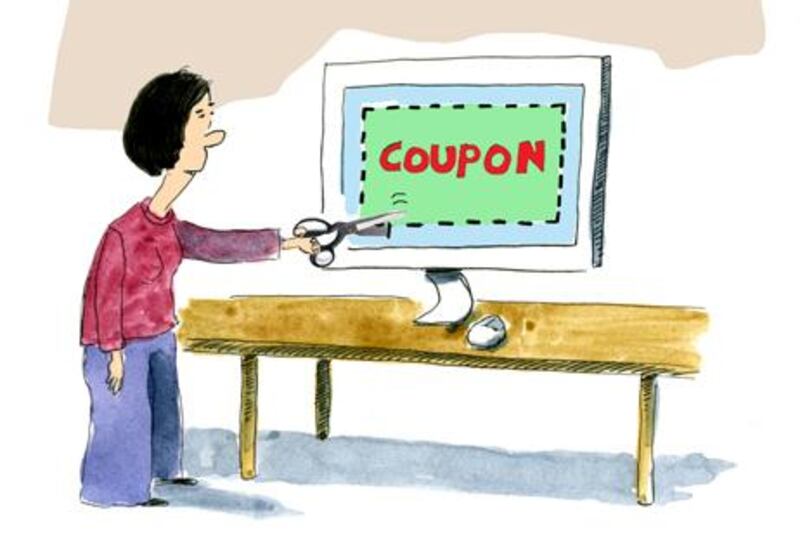'Google offers US$6 billion [Dh22bn] for promising startup."
Those headlines splashed across business pages this week were not necessarily surprising, given the gazillion-dollar stockpile of cash the internet search giant is sitting on, but it raised eyebrows because of the sheer size of the offer, to cite the most obvious reason. Then there was the fact that few people who are not venture capitalists had actually heard of the target company: an online coupon company called Groupon.com.
What was truly flabbergasting, however, was when the Groupon execs put their heads together and decided the offer was just not good enough. Thanks, but no thanks, they replied when presented with $6bn on a platter.
It is enough to make one scratch his head and wonder: are these people absolute nutters?
After a little research, it appeared the answer was unequivocally affirmative.
Using Google's own search engine - how did the Google geniuses not think of doing the same? - I was able to learn within a matter of minutes that the Groupon co-founder and chief executive, the 29-year-old Andrew Mason, lives with more than 20 cats, while the other co-founder is a "relatively new user to the internet and can't get enough of it".
A-ha! About then I started to feel the sensation of my leg being pulled.
It turns out, as I learnt after a little more intensive Googling, that Groupon is actually a thriving business that could change the way many of us spend our money.
The way the site works is that users submit their e-mail addresses and a little biographical data (location, age, gender, etc) and subsequently receive a daily message from a local business about a bargain they might be interested in. The catch, albeit a relatively minor one, is that the offer is not good unless a minimum number of people sign up. So a hotel could promise $249 rooms for $99, but only honour the offer if at least 100 people took the deal. The beauty of the arrangement is that everybody wins: the business gets a volume of buyers, hopefully generating additional purchases and repeat customers; Groupon gets a cut of the revenues produced from the original offer; and customers get discounts on goods and services they enjoy.
A scan of recent deals showed a sushi tasting for $20 with a $40 value, and $20 tickets to a Shakespeare play with a face value of $70. There are also an abundance of spa and beauty packages, which demonstrates the site's popularity among the fairer sex.
It is a booming business, reportedly bringing in $50 million in revenue each month - a drop in the bucket to Google, but pretty impressive for a company that is barely two months old.
It is easy to see Google's interest, as Groupon represents two major changes in the way companies sell their wares online - the keywords are local and social. Small businesses like restaurants, dry cleaners and dentists have found that review sites like Yelp in the US can be hugely effective tools for reaching potential customers who want to find providers in their specific neighbourhoods. And customers like vetting businesses through the recommendations and/or criticisms of other regular people.
Groupon combines a bit of both elements because the offers are targeted to users by location and users have an incentive to bring in friends who may also be interested to make the offer valid.
From an investment perspective, the problem with Groupon is that the business model is relatively easy to replicate. There are reported to be at least 500 similar deal-of-the-day-type companies around the world, including at least one in the UAE. The site GoNabit.com launched this year and works similarly to Groupon. The site's founder, Dan Stuart, has said he thinks it works well in this region because of the culture of shopping as a social experience.
And just this week, a review site called YaDig.com launched in Dubai, providing first-hand user reviews of local restaurants, cafes and nightclubs. It will be fascinating to see how those sites fare here and particularly how they navigate some of the challenges that confronted their forebearers. Yelp, for example, faced allegations that it downplayed negative reviews of businesses that advertise on the site.
For Groupon and its ilk, I would not be surprised if they eventually find that the social element that helps make it so effective can rub some people the wrong way. After all, the business model is basically: "How would you like a half-price meal or massage? Well, it is all yours as long as you can convince a few hundred other willing buyers to sign up as well."
That means I could get my over-enthusiastic friends constantly trying to sell me things so they can save a few bucks or dirhams in the process. Not only will my inbox fill up with offers from these sites, but Facebook and other social-networking venues will be overrun with solicitations.
It is one thing for me to casually scan Facebook and discover that a friend of mine is super excited about getting discount tickets to the circus, and quite another to have him try to convince me to go as well.
The internet, now with more spam. There is an offer that is easy to refuse.






